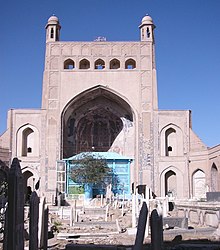
Back أبو إسماعيل الهروي Arabic ابو اسماعيل الهروى ARZ Xacə Abdullah Ənsari Azerbaijani Абу Исмаил Абдолах Ансари Bulgarian খাজা আবদুল্লাহ আনসারি Bengali/Bangla ʿAbdallāh al-Ansārī German خواجه عبدالله انصاری Persian Khawâdjâ Abdallâh Ansârî French עבדאללה אנצארי HE Abd Allah Ansari di Herat Italian
Abū Ismāʿīl al-Harawī | |
|---|---|
أبو إسماعيل الهروي | |
 Abdullah Ansari (holding a book) with Abu Ahmad. Folio from Kamal al-Din Gazurgahi's Majalis al-ushshaq, created in Shiraz, Safavid Iran, second half 16th century | |
| Title | Shaykh al-Islām, Sage of Herat |
| Personal life | |
| Born | May 4, 1006 |
| Died | 1089 (aged 82-83) |
| Religious life | |
| Religion | Islam |
| Denomination | Sunni Islam |
| Jurisprudence | Hanbali[1] |
| Creed | Athari[2] |
| Movement | Sufi[3] |
| Muslim leader | |
Influenced | |
Abu Ismaïl Abdullah al-Harawi al-Ansari or Abdullah Ansari of Herat (1006–1089) (Persian: خواجه عبدالله انصاری) also known as Pir-i Herat (پیر هرات) "Sage of Herat", was a Sufi saint,[7][8] who lived in Herat (modern-day Afghanistan). Ansari was a commentator on the Qur'an, scholar of the Hanbali school of thought (madhhab), traditionalist, polemicist and spiritual master, known for his oratory and poetic talents in Arabic and Persian.[9]


- ^ Halverson, Jeffry R. (2010). Theology and Creed in Sunni Islam. Pelgrave Macmillan. pp. 37. ISBN 9781137473578.
- ^ Halverson, Jeffry R. (2010). Theology and Creed in Sunni Islam. Pelgrave Macmillan. pp. 47. ISBN 9781137473578.
- ^ Halverson, Jeffry R. (2010). Theology and Creed in Sunni Islam. Pelgrave Macmillan. pp. 48. ISBN 9781137473578.
- ^ Slitine, Moulay; Fitzgerald, Michael (2000). The Invocation of God. Islamic Texts Society. p. 4. ISBN 0946621780.
- ^ Ovamir Anjum. "Sufism without Mysticism: Ibn al-Qayyim's Objectives in Madarij al-Salikin". University of Toledo, Ohio. p. 164.
- ^ Livnat Holtzman (January 2009). "Ibn Qayyim al-Jawziyyah". Essays in Arabic Literary Biography. Bar Ilan University: 219.
- ^ A. G. Ravân Farhâdi, ʻAbd Allāh ibn Muḥammad Anṣārī al-Harawī, "ʻAbdullāh Anṣārī of Herāt (1006-1089 C.E.): an early Shia Ṣūfi master", Routledge, 996.
- ^ "ʿABDALLĀH ANṢĀRĪ – Encyclopaedia Iranica". www.iranicaonline.org. Retrieved 2020-05-31.
- ^ Cite error: The named reference
Iranicawas invoked but never defined (see the help page).